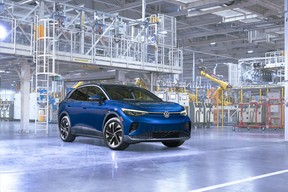Volkswagen says it’s looking for stakes in Ontario mines, while Benz will be shipping the materials to Europe

Article content
Volkswagen and Mercedes-Benz have now signed memorandums of understanding with the Canadian government to provide a “reliable and sustainable supply chain” for the increasingly scarce raw materials that go into electric-vehicle batteries. Nickel, cobalt, lithium, and more are all included in the accord, signed at the Globe and Mail Centre building on the morning of August 23. BMW was noticeable in its absence, but a spokesperson did remind Driving that the Minister of Innovation, Science and Industry, Francois-Philippe Champagne, did visit Munich earlier this summer on a similar “mines to mobility” mission.
Advertisement 2
Article content
The agreement is an effort to shorten and solidify the supply chains so crucial to the automotive industry in recent years. Many of the raw materials used in automotive battery production are sourced from China, something the U.S. is actively trying to discourage with its recently enacted Inflation Reduction Act, which offers US$7,500 in tax credits for EVs if they are assembled in – and if the minerals needed for their batteries are sourced from – North America.
This latest deal is the result of high-level meetings between German Chancellor Olaf Scholz and Prime Minister Justin Trudeau in Toronto and Montreal, in which Scholz extolled Canada as having “similar rich natural resources as Russia — with the difference that it is a reliable democracy.” Volkswagen Chief Executive Officer Herbert Diess — who was recently ousted and is set to be replaced on September 1 — and the Mercedes-Benz board member in charge of development and procurement, Markus Schäfer, were part of the delegation of executives on hand for the signing of the historic deal.
Advertisement 3
Article content
-
![How automakers are investing in Canadian EV production]()
How automakers are investing in Canadian EV production
-
![New EV battery materials plant to create ‘hundreds’ of jobs near Kingston]()
New EV battery materials plant to create ‘hundreds’ of jobs near Kingston
VW’s battery business, PowerCo, will, according to Bloomberg, be one of the clients of these Canadian raw materials. Indeed, according to Reuters, VW board member Thomas Schmall says the automaker “wants to acquire stakes in Canadian mines and mine operators.”
“Volkswagen has been vigorously pushing the transformation to e-mobility, recognizing the industry’s responsibility in the global battle against climate change and […] and I want to thank the Canadian government for its support,” said VW CEO Diess this morning.
(Canada has) similar rich natural resources as Russia — with the difference that it is a reliable democracy
German Chancellor Olaf Scholz
Mercedes-Benz, meanwhile, announced a deal with Rock Tech Lithium that will see annual production of 10,000 tonnes of processed lithium destined for Germany by 2027. The German-Canadian junior mining firm will source its raw ore from the Georgia Lake region — 50 kilometres northeast of Nipigon — but eventually plans to build five high-tech lithium conversion facilities, one in North America and four in Europe, for a total production capacity of 120,000 tonnes of lithium hydroxide annually by 2029. That’s enough, says the company, for 20 per cent of Europe’s projected demand.
Advertisement 4
Article content
That supply is crucial because “Mercedes-Benz plans to go all electric by the end of this decade, wherever market conditions allow. To scale up our electric vehicle production, direct access to primary sources of raw materials is needed to improve the resilience and sustainability of the electric vehicle supply chain,” explains Schafer. “Thanks to our memorandum of understanding with Canada, Mercedes-Benz has a strong and capable partner to break new ground for a new era of sustainable transformation in the automotive industry.”

Volkswagen currently has six EV manufacturing facilities globally, including one in Chattanooga, Tennessee, which manufactures the company’s ID.4; while Mercedes-Benz has seven, its Tuscaloosa, Alabama facility charged with making the EQS and EQE, both battery-powered SUVs. VW is also setting up a battery-cell manufacturing operation somewhere in North America, said Johan De Nysschen, head of Volkswagen of America, last June.
Advertisement 5
Article content
VW is looking for sites for a battery facility in North America, while Mercedes-Benz has joined forces with Stellantis in building its own battery-manufacturing venture. Both plants are likely to be built close to their current Tennessee and Alabama facilities, respectively, because of the difficulties in transporting complete battery assemblies..
Scholz is looking to decrease his country’s reliance on Russia for primary energy, also noting that “We want to cooperate closely, especially when it comes to building a hydrogen economy,” though the PM threw a little cold water on the future of LNG exports to Germany, noting the absence of a natural-gas shipping facility on Canada’s east coast.
Stay connected with us on social media platform for instant update click here to join our Twitter, & Facebook
We are now on Telegram. Click here to join our channel (@TechiUpdate) and stay updated with the latest Technology headlines.
For all the latest Automobiles News Click Here



